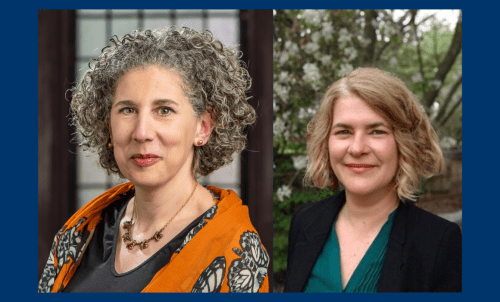Two FAS faculty receive 2025 ACLS Fellowships
Laura Nasrallah and Leslie Gross-Wyrtzen received fellowships from the American Council of Learned Societies to recognize their excellence in humanities and social science research.

Two FAS faculty have been awarded fellowships by the American Council of Learned Societies to support and recognize their excellence in humanities and social science research.
Laura Nasrallah, Buckingham Professor of New Testament Criticism and Interpretation in the Department of Religious Studies and Yale Divinity School, was recognized for her project “Divination Machines in the Ancient Mediterranean World: Randomness, Meaning, and the Sublunar Condition.” The project will see Nasrallah explore how people in the ancient Mediterranean sought messages from the gods through “randomization procedures” like dice throws, and how these rituals demonstrate that “a range of people, from poor to elite, wrestled with issues of justice, knowledge, and the cosmos’ organization.” The project investigates the “complex entwinings of Judaism, Christianity, and Greco-Roman religions.”
Leslie Gross-Wyrtzen, faculty affiliate in the Department of Anthropology and Lecturer in African Studies and Middle East Studies at Yale’s Whitney and Betty MacMillan Center for International and Area Studies, received the ACLS Fellowship for her project “Bordering Blackness: Migration and Dispossession in the Afro-Mediterranean.” Drawing on fieldwork Gross-Wyrtzen has conducted with West and Central African migrants since 2016, the book will analyze how economic and racial logics shape immigration enforcement across the Mediterranean and North Africa. The project will situate contemporary migration crises across the region within longer histories “of African captivity, commodification, and racial othering.”
Both Nasrallah and Gross-Wyrtzen are fellows of Yale’s Whitney Humanities Center, where they had the opportunity to present aspects of these projects and receive feedback from their peers across the humanities.
“Representing many different fields of study—including African diaspora studies, art history, English, gender studies, musicology, philosophy, religious studies, and more—this year’s fellows demonstrate the importance of foundational humanistic inquiry in helping us to understand a wide range of questions concerning our collective and varied histories, narratives, creations, and beliefs,” said ACLS Vice President James Shulman.
The American Council of Learned Societies is a nonprofit federation of 81 scholarly organizations. The organization awarded its 2025 Fellowships to 62 scholars who were selected from a pool of more than 2,300 applicants through a multi-stage peer review process. The ACLS provides up to $60,000 to each fellow to support six to 12 months of full-time research and writing.